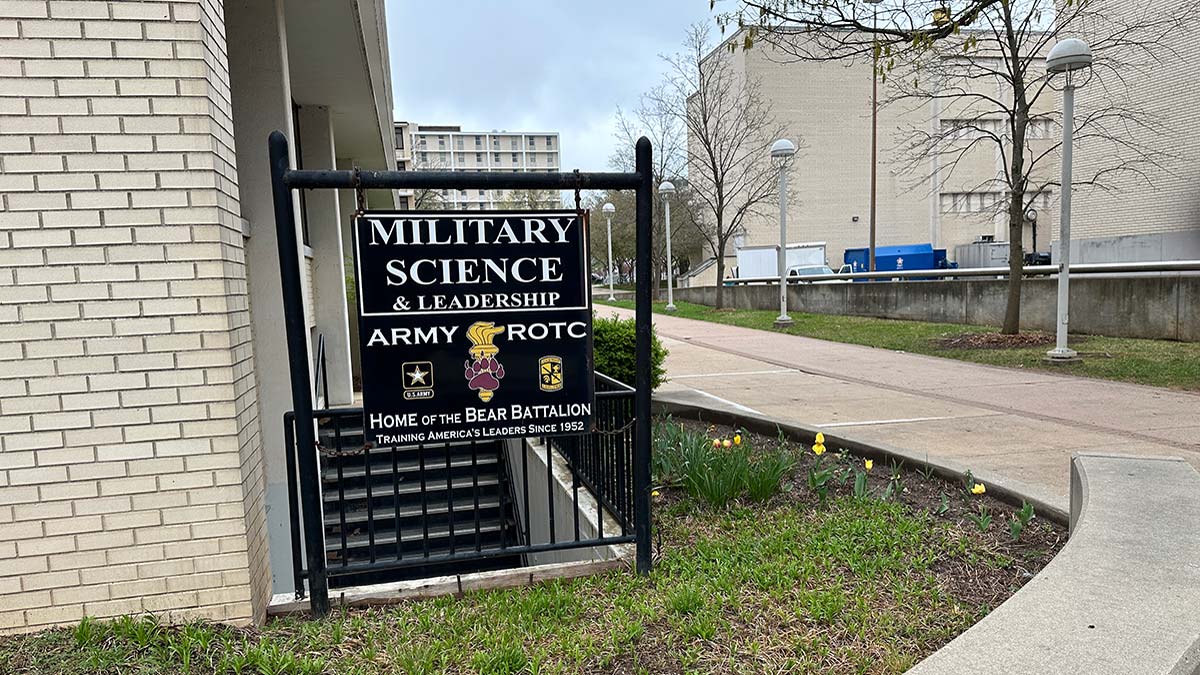Tucked away in the basement of Freudenberger residence hall, the Department of Military Science often goes unnoticed by passersby.
The concrete-grey steps leading down to the department draw little attention.
Just inside, the mood changes. Visitors encounter a bold welcome message on the department’s front doors:
“What’s your warrior? Join our TEAM.”
This is the home of the MSU Bear Battalion.
The Bear Battalion
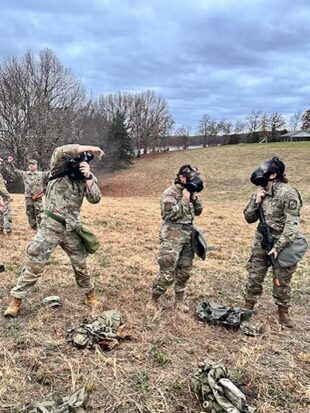
MSU’s Bear Battalion was established in 1952. During the 1970s, the program branched out to include other area schools. At this time, Evangel, Drury and Southwest Baptist University also participate in the Bear Battalion.
According to the Army ROTC website, ROTC was officially created in 1916 when President Woodrow Wilson signed the National Defense Act.
Its roots can be traced back to 1819 when the American Literary, Scientific and Military Academy was formed in Norwich, Vermont, to develop “citizen-soldiers” while providing them with an education.
The concept continued to expand, culminating in the official creation of ROTC in 1916.
Since then, Army ROTC has become the “largest officer-producing organization with the American military.” The organization has produced over 600,000 men and women commissioned officers.
At Missouri State, the Bear Battalion is just part of that 600,000 ROTC-strong.
These young men and women stand out on campus when they wear their military gear, especially on Thursdays, when they have ROTC lab.
Otherwise, they blend in with other MSU students, milling about campus in their jeans and khakis and “BearWear.”
They act like other MSU students, too. They goof off and kid around, they go on spring break trips, they play video games. They are into art and music and movies. They are active in campus organizations and church.
They truly do look and act like “regular” college students. And they want people to know that they are regular college students.
Yet their experience as Bear Battalion cadets does make them a little different.
They admit it themselves when they talk about how ROTC has changed their lives for the better.
Excellent career prospects
Because of their participation in ROTC, Bear Battalion cadets are well ahead of their college peers in job prospects and pay, according to Phil Roberson, Enrollment and Scholarship Officer in the Department of Military Science.
“Army ROTC students have gained a level of maturity and responsibility above their peers, are physically fit, well-rounded leaders, and graduate with less debt than the average student,” Roberson said. “They have a job lined up and a career path to success.”
That’s because ROTC provides a direct path to an ideal career, ranging from clinical psychologist to agriculturist or even an English teacher.
Yes, ROTC accepts all majors. There’s a perfect place for nearly every academic background within the military.
“We have an open door for everyone,” Roberson said. “This is where I come in. I help students pave a path forward that aligns with their individual needs.”
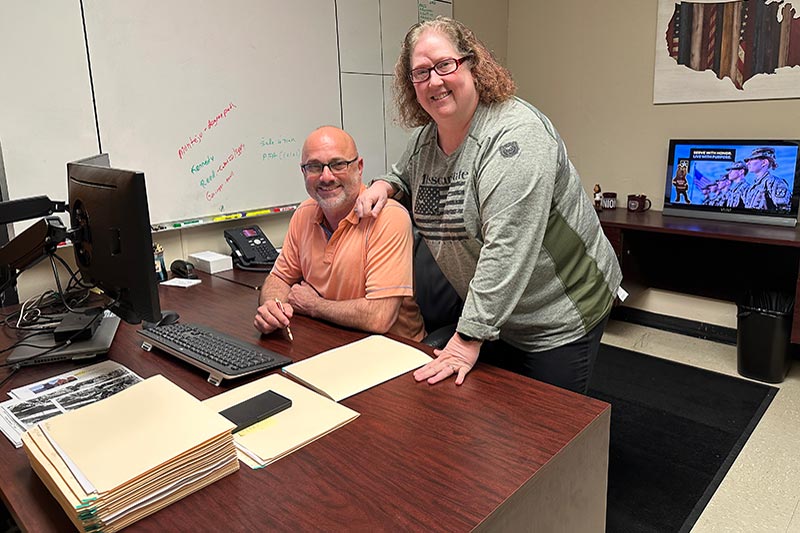
Another benefit is immediate employment upon graduation.
“Upon completion of ROTC and graduation from college, students can begin their career as an officer in the Army National Guard, U.S. Army Reserves or active duty,” Roberson said. “Students who enter active-duty careers after college commonly have starting salaries of around $60,000–$70,000 a year, depending on location.”
Graduating debt free
Army ROTC offers students impressive benefits. In many cases, students enjoy a tuition-free education, which includes a monthly stipend and the opportunity to compete for additional internal scholarships specific to ROTC, Roberson explained.
“Not having any debt is really nice,” said junior psychology major Caleb Clouse, who plans to become an Army chaplain and counselor after graduation. He also appreciates a steady paycheck, “so I don’t have to work as much and I can concentrate on school, especially ROTC activities.”
Multiple options to pay for school
Army ROTC members can choose from several options to help pay for their education.
Under the Army ROTC scholarship option, students can choose from either a full tuition and fees option or a flat rate stipend of $6,000 per semester. Both paths provide an annual allowance for textbooks and a monthly stipend per academic month.
Those who choose an Army National Guard (ARNG) simultaneous membership with ROTC receive tuition assistance up to 39-credit hours annually, monthly drill pay and a monthly stipend per academic month.
Junior general agriculture major Maya Hufman took this route. As part of her benefit package, she gets fully paid tuition, $382/month for a weekend with National Guard and a stipend of $420 with ROTC.
Hufman doesn’t have to worry about working another job to earn additional money.
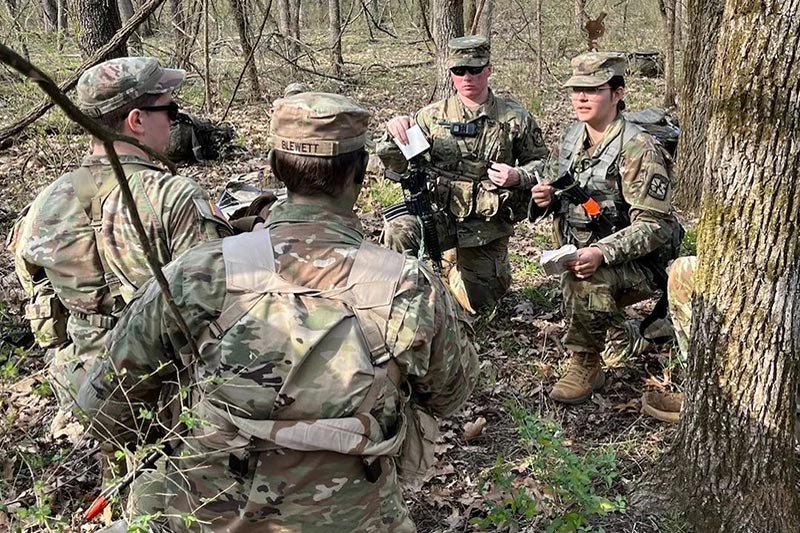
A third option for ROTC students is basic camp, an immersive, five-week summer training course at Fort Knox, Kentucky.
Basic camp is an accelerated program for students who did not take introductory military science courses during their freshman and sophomore years. This option gets them “caught up” so that they can enroll in the advanced courses.
Eligible students earn either a $5,000 bonus or a two-year scholarship with the basic camp option.
Trying it out with MIL 101 and MIL 102
Students who are curious about a military career but remain uncertain can take introductory courses to learn more.
These courses are Introduction to Military Science (MIL 101) and Introduction to Basic Military Skills (MIL 102). Neither course requires any military commitment, according to Roberson.
“I think ROTC is not well understood, and it helps to break through social misconceptions and fear of the unknown by getting more students into the 100-level courses,” Roberson said.
“It’s like a test run to see if being in the Army is something a student might want to commit to in the long run,” he added.
But there’s an advantage to taking MIL 101 and 102 during the freshman year of college.
“By plugging into the ROTC curriculum earlier, students will have more time to explore their interests and be eligible to receive benefits sooner,” Roberson explained.
Along with no obligation to contract into ROTC, students taking MIL 101 and 102 are not expected to be “military-ready,” Roberson said.
“MIL 101 and 102 do not require physical fitness training, leadership labs, field training, combat water survival, etc.,” he said. “But students can participate in all the fun stuff outside the classroom if they choose.”
MIL 101 and 102 are safe spaces to explore ROTC. They also are excellent ways to simply learn more about how the American military functions.
“Give it a try,” said senior psychology major Zachary Gorenflo, who plans to become a clinical psychologist. “You’re trying something new and no one’s going to give you guff if you end up stepping aside.”
It’s more than about the money
Bear Battalion cadets agree that benefits like paid tuition and monthly stipends are nice—really nice.
But for many of them, being in ROTC is much more than about money.
It’s about identity, values, purpose, pride—a sense of doing more, being better and belonging to something much bigger than themselves.
Learning to lead
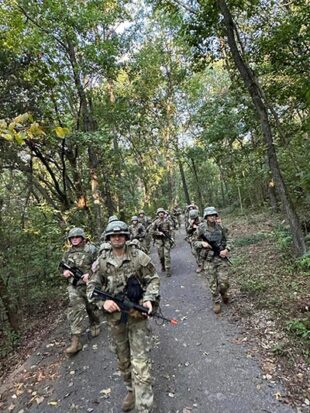
“Money isn’t the reason I did this,” Hufman said. “I wish people understood that everything we do here is earned, and how much their life can change.”
So far, she has found leadership training the most rewarding aspect of ROTC.
“ROTC really pushed me to focus on myself as a human being to succeed,” she said.
Gorenflo also expressed appreciation for the leadership training ROTC provides, describing it as cultivating a kind of “leadership instinct.”
“As a leader, you have that instinct to step up and stand out amongst your peers,” Gorenflo explained.”
The purpose of being in ROTC, he added, was not about “being perfect.”
“It’s about making those mistakes. You know how to bounce back from those if you do make them.”
These are the kinds of comments that make Roberson smile.
“The most rewarding part [of my job] is to see how much students grow while in ROTC and become the leader they never knew they could be,” he said.
Gaining life skills and professional connections
Leadership training is just one of several life skills gained in ROTC. Another is time management, something that makes Bear Battalion cadets very much like every other college student.
“We’re like everyone else here, but we have to get up a little earlier,” Clouse said.
Ryan Harris, who is enrolled as an English education major at Evangel University while completing his ROTC and military science courses at MSU, said he appreciates the networking opportunities ROTC provides.
“[Being at both schools] has helped me have a wider scope of networking and relationships and opportunities that I wouldn’t have just being at Evangel or just being at Missouri State,” Harris said.
Harris plans to go directly into four years of active duty after graduation. He then hopes to remain in the National Guard while teaching English. He eventually wants to become a school principal.
Like his fellow cadets, he also has found more than just monetary value in ROTC. He takes pride in what ROTC represents.
“I think what we’re doing here—and the job we’re preparing for—is a little special because it carries so much weight and responsibility with it,” Harris said.
“Playing Army”
For many in the Bear Battalion, the big draw of Army ROTC is the Army itself.
There’s no mistaking that ROTC students train to conduct war.
According to Roberson, ROTC students practice using topographic maps and compasses to navigate different terrains. They learn how to rappel. They become skilled in combat water survival, weapons safety and primary marksmanship and first aid (what the military calls “tactical casualty care”).
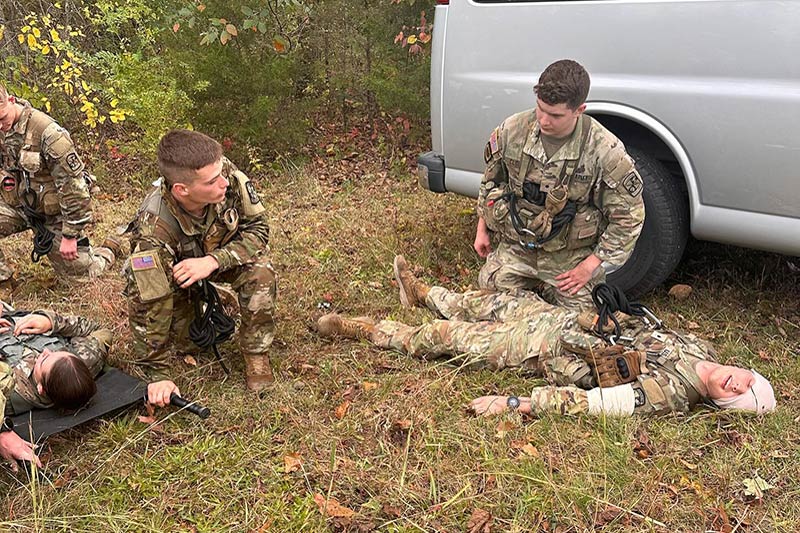
They also learn how to lead troops, execute operation orders, and how to plan, resource and execute major training events. They navigate obstacle courses and endure long road marches. They engage in rigorous physical fitness routines.
“Physical fitness is designed for improvement and sustainment,” Roberson said. “It is nice if students come into the program already physically fit, but it is not required. It is perfectly fine if an incoming student can only do one single pushup if they are willing to put in the work to improve over time.”
Of course, other college courses and programs have similar physical rigor. But do they fly in helicopters?
ROTC students do. And shoot machine guns.
“I think sometimes we definitely could come off as intimidating,” Harris said. “We do hard stuff, and we have reason to walk with our chests out.”
“Best decision of my life so far”
Junior criminology major Vance Mullins is one of those cadets who has been fascinated by the military since he was 8 years old.
“Ever since I was a kid, it’s always been military, military, military,” Mullins smiled.
Having contracted into ROTC his sophomore year, Mullins plans to immediately go into active duty after graduation, hoping eventually to become a Special Forces Ranger.
He believes his life would be “pretty dry” if he had not joined ROTC.
“I have a lot of passion and drive,” Mullins said. “I enjoy being in the rain, getting muddy. That’s my type of fun.”
“Playing Army” aside, ROTC for Mullins has meant personal fulfillment.
Mullins transferred to MSU from another school, where he felt invisible.
“I didn’t go here my freshman year,” he explained. “My freshman year I kept to myself. I felt like my voice was completely unheard.”
Bear Battalion changed all that.
“I was the new kid, the transfer, these guys were already here,” he explained, gesturing to Gorenflo, Harris and Clouse. “They didn’t know me, but they took me under their wing, they showed me the ropes, and now we’re best friends.”
“Coming to this program at Missouri State has been the best decision of my life so far,” Mullins declared.
Finding a family
The word “family” comes up quite a bit when cadets talk about Bear Battalion.
“The thing that keeps me coming back every single day, that gets me up in the morning, is my friends here,” Clouse said. “We are very close. I almost consider them family, we’re so close.”
“I think that’s the biggest encouragement and it’s also the biggest advantage we have here at ROTC,” he added.
Gorenflo agreed. “I joined seeking the education side and paying for college, but I ended up getting rewarded with a family,” he explained.
“Everyone out there is kind of worried about themselves,” Gorenflo continued. “Meanwhile, I can call anyone here at midnight, and they’d be more than willing and happy to answer the phone, come help me out, then and there.”
“Out there, you don’t necessarily get that opportunity and, at least within this tight-knit group, I’m afforded that comfort of knowing that people are actually worried about my well-being,” he added.
“I think anyone who’s looking to join ROTC, they’re going to be joining a family and they’re going to be included,” Clouse said.
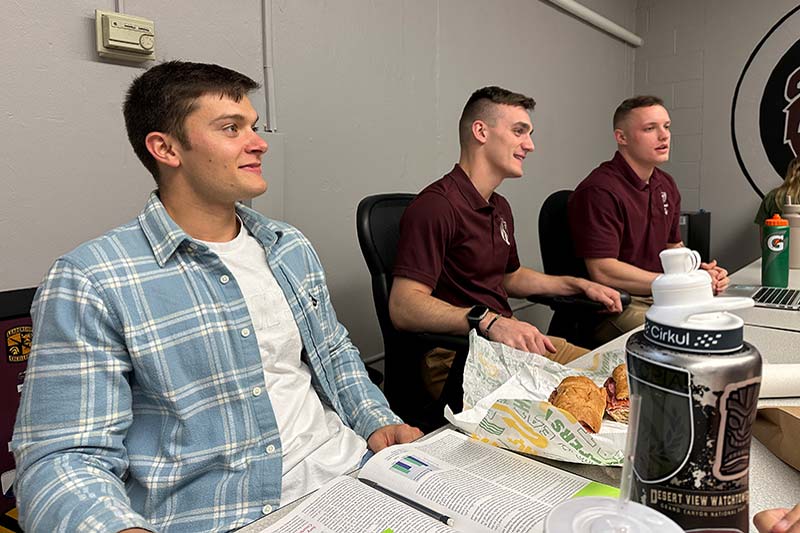
Who’s behind that uniform? A college student
Over and again, Bear Battalion cadets characterize their experience within the ROTC circle as supportive, accepting and friendly.
Outside the department, though, is sometimes a different story.
Mullins described scenarios in which he would get laughs and “fake salutes” while walking on campus in uniform.
“That’s okay, I can take it,” Mullins said. “But I wish [people] understood that we’re just regular people, regular college students. We’re students first.”
Just sit and visit with them for a while, and this becomes all too clear.
They kid each other—a lot. But the tone is affectionate, not sarcastic.
The older ones smile knowingly when a new recruit is described as “hoo-ah,” which in military talk often means someone who is perhaps a little too enthusiastic about ROTC.
Clouse laughingly admits he plays Minecraft almost to the point of nerdom.
Several of the cadets are very active in ROTC’s social and honor societies, Scabbard & Blade and Pershing Rifles.
“We’re trying to be more involved and grow our program more, that’s all,” Mullins said. “People walk by our entrance all the time not knowing that there’s even an ROTC department here.”
“They just see the uniform and think we’re from somewhere else or visiting,” he added.
Harris agreed that non-military students can have mistaken or poorly informed perceptions of ROTC cadets.
“I wish people wouldn’t think we’re weird because we walk around in uniform,” he said. “They’re going [to class] to learn and to prepare for a job one day, and that’s the exact same thing we’re doing. It just looks a little different.”
Harris acknowledged that perhaps there’s a “look” about ROTC students that goes beyond different clothes.
“That mindset of striving for excellence and being a leader that we build here definitely can come across as intimidating to other students,” Harris said.
“We do get a lot of looks, and people treat you differently,” Clouse added. “But you have to act differently in uniform. You’re representing something bigger than yourself.”
Clouse tries to wear civilian clothing whenever he is in class or attending a student government meeting, one of the many non-ROTC organizations to which he belongs.
“I try not to show up in uniform just because it often influences what people think. They don’t see us as regular college students,” he said.
And yet, despite the uniforms and the weapons and getting up at 4:30 in the morning, Bear Battalion cadets are all still college students.
And what do college students typically say they enjoy most about the college experience itself?
Friendships.
Mullins said that for him, the best thing about ROTC has been building relationships—“the mentoring, something that gets passed down every year, something you take with you,” he explained. “We see each other every day, and there’s no reason why you wouldn’t develop a lifelong friendship.”
In similar terms, Gorenflo explained what ROTC means to him by saying he wished students would at least check it out, even if they decide not to remain in the program.
“I’ll still be a buddy to you,” Gorenflo said. “I’m still a student. I’ll be more than happy to still study psychology with you, even if you decide not to do ROTC.”
“I’m just happy that you came and gave it a try and we kind of built a bond that way.”

